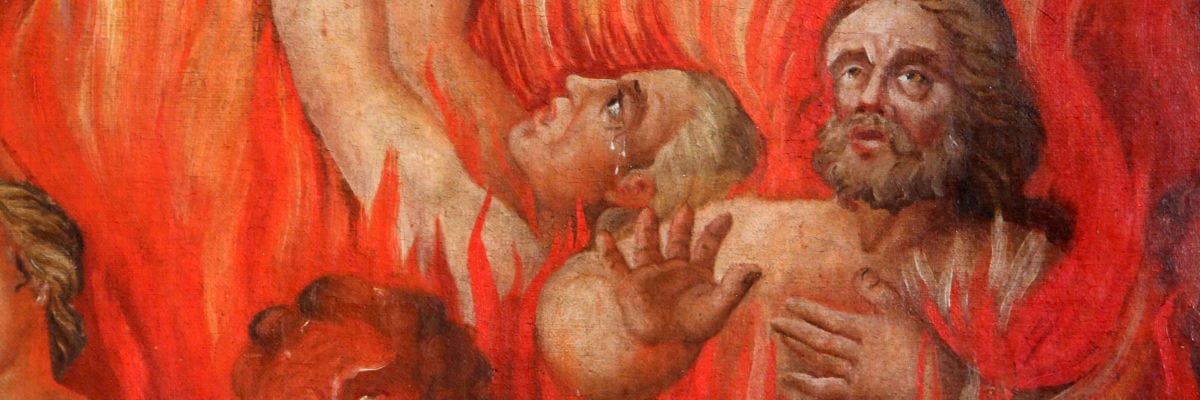
How Could a Merciful God Create Hell? Jimmy Akin and host Cy Kellett tackle this question in light of different definitions of mercy.
Transcript:
Caller: The idea that once you’re in hell, you’re not getting out ever and still hold that God is all merciful? How do you believe this?
Jimmy: Okay, well, there are a number of ways of approaching this, but I’ll tell you how I would approach it. I think that a lot of people base their understanding on biblical imagery, but they tend to conceive of hell as eternal conscious torment, which is understood as eternal conscious torture. So, like, you know, God sentences you, like a prisoner in the ancient world, to, like, okay, take this guy into a cell and torture him. That is based on imagery in scripture. It’s also given rise to some concepts that we don’t actually find in scripture. Like, people will have this idea that in hell, demons torture people. But that’s not actually found in scripture; that’s later speculation.
So, there is torture-like imagery that’s used to convey what hell is like. But because the afterlife exceeds our ability to imagine in this life, I don’t think we should take these images overly literally. And so I don’t think that God has actual torturers that he’s going to use for people who are in hell.
Another image that gets used for hell is exclusion. This image occurs in Jesus’s parables where he’ll say things like, he’ll have the king say, “Throw this person into outer darkness.” That image is one of exclusion rather than positive torture. I think that’s a bit closer to how I would understand hell. I think it’s separation from a loving union with God.
But I think even that image is likely to be accommodated to the way kings would banish people from their presence in the ancient world. I think that really what happens is more likely to be that the person excludes themself from a union with God. So, I don’t imagine so much God saying, “Kick this guy out,” as the person just refusing to come into communion with God and his love.
Therefore, the person, because they’re excluding themselves from God’s love, has refused to embrace it. Well, then they’re going to be living without love as long as they exclude God’s love. And living without love ain’t fun. I mean, there are all kinds of rock songs and country songs, and presumably lots of other songs about how it ain’t any fun to live without love.
So I think that that’s the core of what hell really is. At least that’s my guess. I don’t know because I’m still in this life. But my guess is that hell is a refusal to enter into God’s love, and therefore that results in an experience that is no fun. But that’s different than saying someone is being tortured for all eternity.
Now, the question then that you asked, Rebecca, is why does this go on? Let me back up one step. So this understanding of hell that I’m articulating as a refusal to enter God’s love, well, God then simply respects that person’s decision, and he is being merciful in that he’s continuing to allow the person to exist. That’s a good thing.
He’s continuing to respect the person’s wishes, and that’s a good thing. So I think that makes it easier to understand how we can square this idea of hell with God’s mercy. He’s being merciful to the person; he lets them exist, so he’s still giving them the gift of existence. And even though this experience isn’t fun, that doesn’t mean it involves actual torture.
It does involve God respecting the person’s decision. So that leaves us with how does this go on forever? The answer, I think, there is that there have been different ways that Christian thinkers have articulated this in history. But what I would point out is that it is the standard understanding that we have a probationary period that is coincident with our lives.
God wants us to ultimately make a choice for or against him, and that happens at the end of our lives. Whatever our final choice is, that’s our final choice, and our will becomes fixed on that choice. So if you die having accepted God’s love, then forever thereafter you accept his love. If you die having rejected his love, then forever thereafter you reject his love. You don’t want it.
I would say that’s the reason that this experience of hell would go on forever. It’s because the people who have chosen it, their will has become fixed, just like the will of the righteous has become fixed. They don’t want anything different. So they’ve chosen, “I don’t want God’s love,” and they will continue to not want God’s love for all eternity.
God will respect that decision and let them have an experience that is not bad in every way. They still exist, for example, but they won’t have proper union with his love. He just respects that choice. Since they don’t change that opinion, he continues to respect that choice.
Now, that doesn’t solve every difficulty involved here, but I think that goes a long way to squaring this concept with the idea of God being merciful. Sometimes people make it harder by using terms like “all merciful,” because “all” can be, when you put “all” in front of “merciful,” it can imply things that are, how can I put it, that are a sort of more romantic understanding of what actual mercy is than what is the case for true mercy.
True mercy does involve respect for people and their choices. But I would say the scenario I’ve sketched out at least goes a long way. It doesn’t remove all tension, but it does go a long way. I would propose to how an eternal hell could be understood in light of a merciful God.
I hope that’s helpful.
Cy:
Thanks, Rebecca. We got time for another one before we have to go. We have to take a break. Let’s go to Alexander in California, watching on YouTube.



